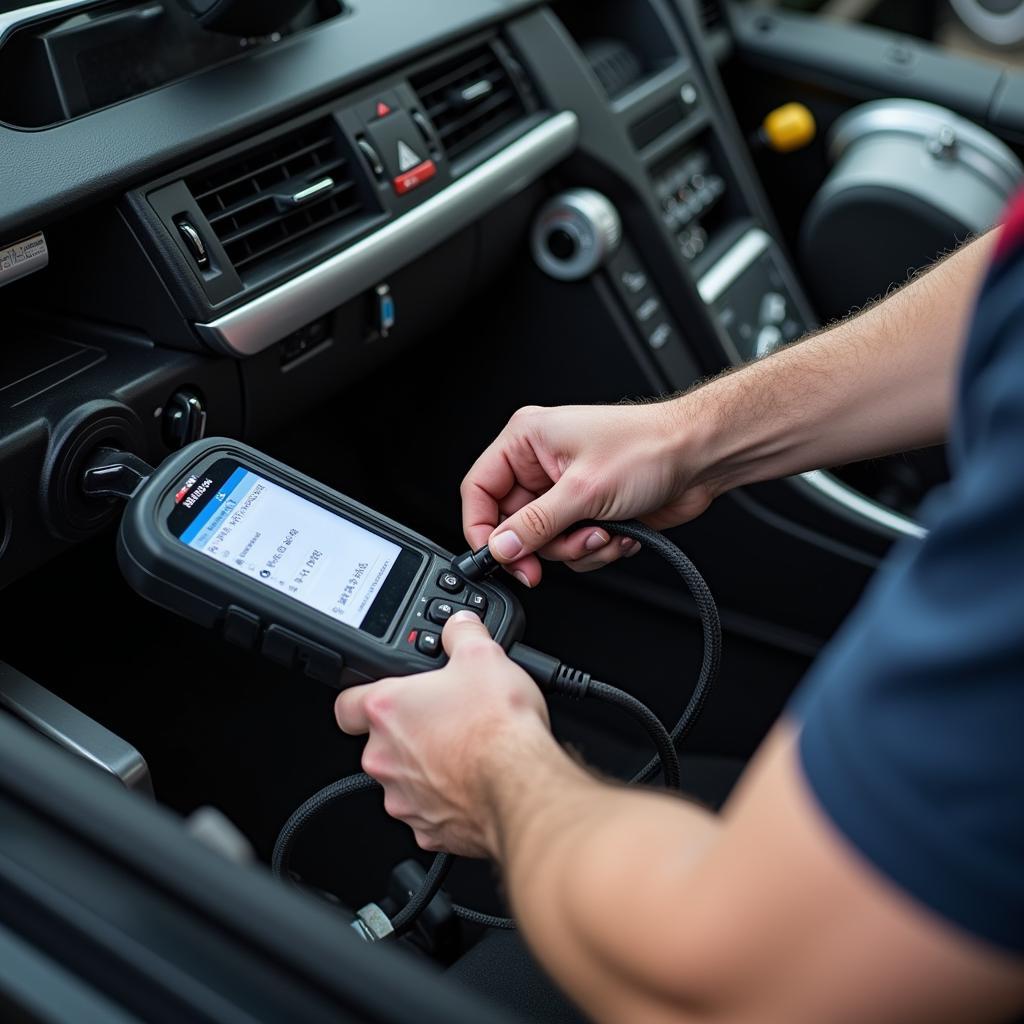One of the most frustrating car problems is an intermittent fault – the kind that pops up occasionally, wreaking havoc on your car’s performance, only to vanish like a ghost when you take it to the mechanic. This begs the question: will an intermittent fault in car show on diagnostics? The answer, unfortunately, isn’t a simple yes or no. Let’s delve deeper into the world of car diagnostics and intermittent gremlins.
Understanding Intermittent Faults and Diagnostics
Before we dive into the “will it, won’t it” conundrum, let’s define our terms. An intermittent fault is a problem that only occurs sporadically. This could be anything from a loose connection to a sensor operating erratically under specific conditions. On the other hand, diagnostics refer to the process of using a car diagnostic tool, also known as an OBD2 scanner, to read fault codes stored in your car’s computer. These codes act like clues, pointing mechanics towards the potential source of the problem.
 Car Diagnostics for Intermittent Faults
Car Diagnostics for Intermittent Faults
So, Will Diagnostics Always Catch Intermittent Faults?
Here’s the catch – diagnostics are only as good as the information they receive. If the fault isn’t occurring at the exact moment you hook up the scanner, there’s a good chance the diagnostic tool won’t detect a problem. It’s like trying to catch a thief who only strikes when no one’s watching.
However, this doesn’t mean diagnostics are useless for intermittent faults. Here’s why:
- Stored Codes: Even if the fault isn’t active, your car’s computer might have stored a “pending” or “history” code related to the issue. These codes can provide valuable clues for a skilled mechanic.
- Freeze Frame Data: Think of this as a snapshot of what was happening with your car when the fault occurred. It can include information like engine speed, temperature, and throttle position, helping pinpoint the trigger for the intermittent problem.
- Live Data: While the fault isn’t active, observing live data from various sensors while driving can reveal subtle anomalies or patterns that point towards the root cause.
What to Do When Faced with an Intermittent Fault
Dealing with an intermittent fault can feel like navigating a maze blindfolded. Here’s what you can do:
- Document Everything: Keep a detailed record of when the fault occurs, the symptoms, and any factors that might be contributing to it (e.g., weather, temperature, driving conditions).
- Choose Your Mechanic Wisely: Find a mechanic specializing in diagnostics and has experience with your car make and model.
- Be Patient: Diagnosing intermittent faults takes time and might involve multiple visits to the mechanic.
- Consider Advanced Diagnostics: In some cases, specialized diagnostic equipment or driving tests might be necessary to pinpoint the elusive culprit.
Common Intermittent Fault Scenarios and Their Diagnostic Challenges
- The Check Engine Light That Plays Hide and Seek: This is a classic example of an intermittent fault. The light might come on for a short while, then disappear, leaving no trace on the diagnostic scanner – except maybe a history code.
- The Stuttering Engine: Imagine your engine randomly hesitating or misfiring, only to behave perfectly fine on your next drive. Diagnosing this requires analyzing fuel trims, ignition patterns, and sensor data for inconsistencies.
- The Electrical Gremlins: From flickering lights to malfunctioning power windows, intermittent electrical issues can be a nightmare to diagnose. These often involve tracking down loose connections, corroded wires, or faulty relays.
how long for diagnostic test on car
Expert Insights
“Diagnosing intermittent faults is like solving a puzzle,” says John Smith, a seasoned automotive diagnostician with over 20 years of experience. “The key is to gather as much information as possible from the car’s computer, the driver’s experience, and careful observation during testing.”
Conclusion
While an intermittent fault in a car might not always show up on diagnostics immediately, it doesn’t mean you’re helpless. By understanding how car diagnostics work, providing your mechanic with detailed information, and being patient, you can increase the chances of identifying and fixing even the most elusive car problems.
Remember, early detection and repair can save you from costly repairs and potential safety hazards down the road.
FAQ
1. Can a bad battery cause intermittent faults?
Yes, a weak or failing battery can disrupt the flow of electricity in your car’s electrical system, leading to various intermittent issues.
2. Should I be concerned about driving with an intermittent fault?
While some intermittent faults might seem minor, ignoring them can lead to more severe problems and potential safety risks. It’s crucial to address them promptly.
where to get a free diagnostic test on my car
3. Can I use a code reader to diagnose an intermittent fault myself?
While basic code readers can read and clear fault codes, they might not provide the depth of information needed to diagnose complex intermittent issues. It’s best to consult a qualified mechanic for accurate diagnosis and repair.
4. How much does it cost to diagnose an intermittent fault?
The cost of diagnosis can vary depending on the complexity of the issue, the labor rates in your area, and whether any specialized equipment is required.
whats a diagnostic test on a car
5. Can extreme temperatures cause intermittent faults?
Yes, extreme heat or cold can affect the performance of various sensors and electrical components in your car, potentially triggering intermittent problems.
6. Are intermittent faults covered under warranty?
Warranty coverage for intermittent faults varies depending on the specific terms of your car’s warranty and the nature of the problem.
7. What are some common signs of a faulty sensor?
Common signs of a faulty sensor include illuminated warning lights on the dashboard, poor engine performance (stalling, hesitation, rough idling), decreased fuel economy, and unusual noises.
Need help with a tricky car issue? Contact our team of expert car diagnostic technicians via WhatsApp: +1(641)206-8880, or Email: [email protected]. We’re available 24/7 to help you get back on the road safely.

Leave a Reply